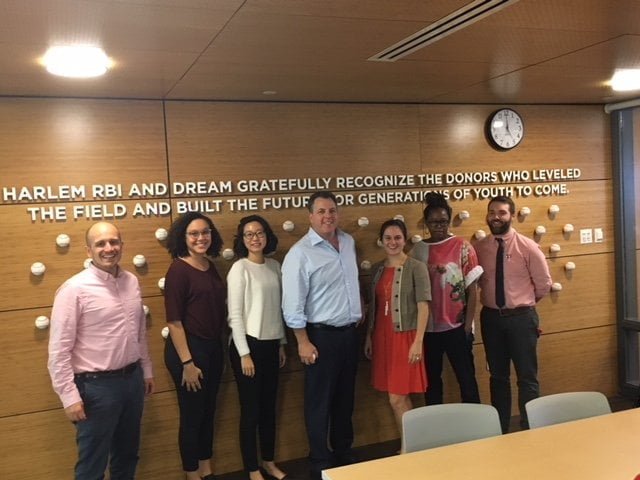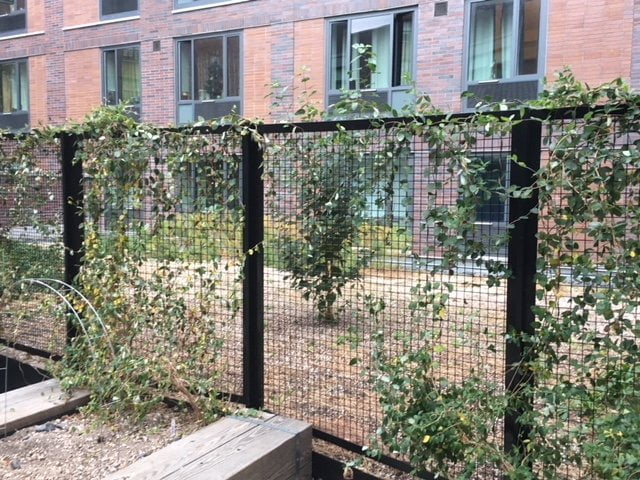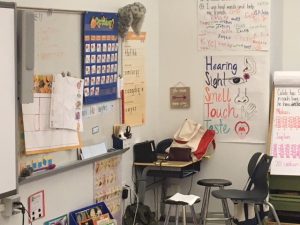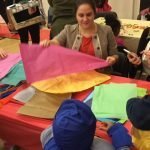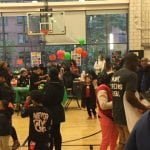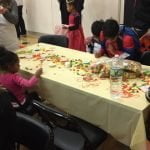Better Than Most is a regular feature of The Business of Giving, examining the best places to work among social good businesses and nonprofit organizations.
Denver: This evening, we’re going to head uptown to 103rd St. and Second Avenue to visit DREAM. DREAM, formerly Harlem RBI, has been using the power of teams to inspire youth to recognize their potential and realize their dreams since 1991. We’ll start with their Executive Director Rich Berlin, and then hear from other members of the DREAM Team.
Rich: I think in terms of organizational culture, one of the things I would like to focus on, organization wide, is that historically this has always been an organization which is both high expectations and high support for the young people who come here. We really believe in the unlimited potential of young people, and we believe it is our job to help unlock that potential and literally do whatever is necessary to get that done.
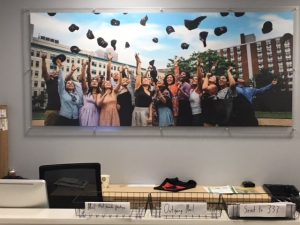 Felicia: So, recently, we’ve really been investing in ways to create official channels of communications for staff to voice their opinions or have a say in office and culture manners. And we’ve done that most recently through our culture committee, which is really charged with creating opportunities for staff to have fun, so they plan everything from our staff parties and our ice cream socials or our March Madness [viewing] parties to also finding ways to celebrate and champion people who are doing amazing work throughout the organization. And then also, like real talk to have real voice on what’s going on in the org. So, a real pulse check for the org and it’s our way of finding out from staff what’s going on and what could be better or make us a better organization.
Felicia: So, recently, we’ve really been investing in ways to create official channels of communications for staff to voice their opinions or have a say in office and culture manners. And we’ve done that most recently through our culture committee, which is really charged with creating opportunities for staff to have fun, so they plan everything from our staff parties and our ice cream socials or our March Madness [viewing] parties to also finding ways to celebrate and champion people who are doing amazing work throughout the organization. And then also, like real talk to have real voice on what’s going on in the org. So, a real pulse check for the org and it’s our way of finding out from staff what’s going on and what could be better or make us a better organization.
Katie: I feel like at DREAM, my experience has been like if I say it something I think I need and that I think will help, people are willing to support it and really give me that trust and invest in my learning and that has been really one of the key ways that the organization has shown me that they care about me or value me.
Amanda: But I think that’s what’s great about our organization is that not only do we have our own alum on staff but we also look to employ as many individuals from our communities or alike communities as possible, I mean all of our roles, and to really build strategic pipelines to growth to have those folks move up within our organization. So, if you look at our full-time staff now, about 20% of them come from either being an alum or having been a part-time staff member or an intern within our organization. And that’s what we’re really looking to increase, is to increase the diversity that we have on staff in general but then to also invest in the communities that are around us, whether it’s my own friends or whether it’s people who become friends and continue to be a part of our family.
Jeremy: But then we start to pull on threads to make sure that once they’re really comfortable that we can really reveal who they are. How and to what extent would they go to for our families and our children? What big things have they changed their mind about during their life? We’ll ask them off-the-wall questions to see as much as possible what their true beliefs are during those. And what we found is that the more we push there, the higher the alignment is of the people that we found. So, as much as it seems that it’s very scripted and seems like a traditional interview, it’s far from that once you get about 20 minutes into it.
Chris: Since I came here four years ago, DREAM has implemented something called the Teacher Career Pathway, which has been something that’s been a really strong force in me feeling like I’m becoming a better teacher and feeling like wanting to stay a teacher is valued here. I feel like a lot of other organizations, schools in particular, the career pathway for a teacher who is advancing is to become some type of advisor or a coach or administrator, and I really like teaching and I want to become better at teaching. And so when they implemented this Teacher Career Pathway, there’s a root and a path to take and steps that you can get to that both acknowledge where you are as a teacher right now and what you could become as a teacher. And I feel like it’s made me feel a lot more like a professional and that wanting to stay as a teacher and become a better teacher is really valued within the organization.
Rich: I think the other side is what I would call deep empathy, and that is an understanding of the context within which we work — a community, a black and brown poor community that is historically marginalized and continually marginalized by some of the structural barriers in our society. And whether you come from this community or not, you have to understand where you have empathy gaps simply because your experience is different and you have to be oriented toward learning and listening from people who’ve had different life experiences than you, because you can’t do this work well unless you understand where people come from, space and place where we work.
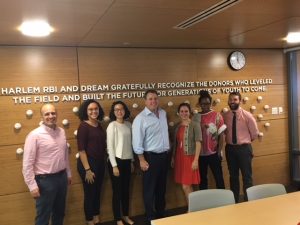 Jeremy: We have decided that, why not, let’s go for making well-rounded people and empowering people from this community to be able to contribute, right? And live the life that they want to live. That requires a pretty complex program where we have everything from school teachers, to program coordinators, to communications associates, to van drivers and umpires and baseball coaches and flag football coaches. And the whole idea is that everyone believes that each one of those people are central to the success of our kids. So, you can’t be successful here unless you actually believe that you’re going to work better if you’re on a team with all of those people. So, that my favorite part about that is the kind of meetings that I see that are the most wonderful pairings but so unlikely.
Jeremy: We have decided that, why not, let’s go for making well-rounded people and empowering people from this community to be able to contribute, right? And live the life that they want to live. That requires a pretty complex program where we have everything from school teachers, to program coordinators, to communications associates, to van drivers and umpires and baseball coaches and flag football coaches. And the whole idea is that everyone believes that each one of those people are central to the success of our kids. So, you can’t be successful here unless you actually believe that you’re going to work better if you’re on a team with all of those people. So, that my favorite part about that is the kind of meetings that I see that are the most wonderful pairings but so unlikely.
Rich: And maybe a way to term that is I think of the solution for any current complexity is greater complexity. Make your problem bigger. Don’t make your problem smaller or don’t try and just get stuck solving the same problem. The way to push a little rock up a hill is to find a bigger rock to push up the hill because it’s going to take more hands. It’s going to take different technology. It’s going to take a better strategy. So, if you can figure out how to do the big rock, then surely the little rock will move that much easier.
Felicia: In culture committee, we are continually trying to figure out what’s the best way to recognize staff, what’s the best way to celebrate their work. It’s a really hard thing to do when people’s work is so different in this organization and is in so many different places. But the one thing that we always come back to is exposing people to each other’s work. So, finding ways for staff to see it in action, to experience it is a way for staff to receive recognition. If they feel people know what they’re doing, and not that this is born out of culture committee, but one of the things that I think is amazing about our organization is to the extent in which we work to get staff to volunteer in the organization’s work.
Hannah: And I think the innovation piece. So, again, I’ve been here for over seven years, and not one year has been the same. Every single year has been different. Every year I’ve had new projects to work on. I’ve had different skills that I’ve had to grow and learn in order to reach the goals that we set for ourselves. So, I think we set such a high bar for ourselves, for every single person to not do the same thing that we did the year before but to evaluate to see what can we do better and how can we advance.
Katie: Every August, we spend two full days as a whole staff doing home visits. So, teachers are paired with non-instructional staff members and visit the homes of all the students that are going to be in their class that year. And I think it’s just a wonderful experience to meet with the families and the children before the year starts. Start out on a positive note. Demonstrate how much you care about getting to know them personally in their environment, and really starting to build that trust and that strong relationship that’s going to help you have a great school year.
Jeremy: It’s really pretty remarkable the levels of which many of our staff go to, to support each other and the programs or to enrich themselves. I can’t tell you how many people in this organization are tutors, how many of the people in this organization are mentors for our college students who attend locally, and how many people are coaches. They coach our baseball teams, they coach our softball teams. They volunteer as a wrestling coach, and you will often see our biggest events, our galas, and those sorts of things fully staffed, not by a catering staff, but by DREAM employees, and they look like they’re having a blast doing it.
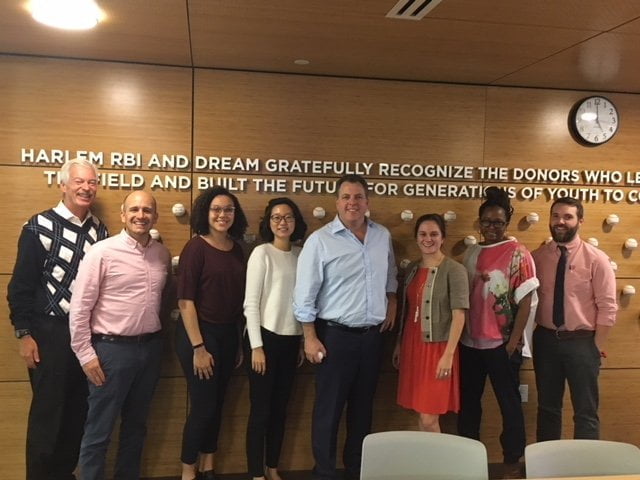
Denver: I want to thank all of those who took part in this segment: Hannah Baek, Felicia Crump, Katie Doctor, Amanda Yepez, Jeremy Abarno, Chris Ignaciuk, and Rich Berlin. To listen to this again, read the transcript, or see pictures of those who participated in this piece, they’re all available if you come to denver-frederick.com
The Business of Giving can be heard every Sunday evening between 6:00 p.m. and 7:00 p.m. Eastern on AM 970 The Answer in New York and on iHeartRadio. You can follow us @bizofgive on Twitter, @bizofgive on Instagram and at http://www.facebook.com/BusinessOfGiving

